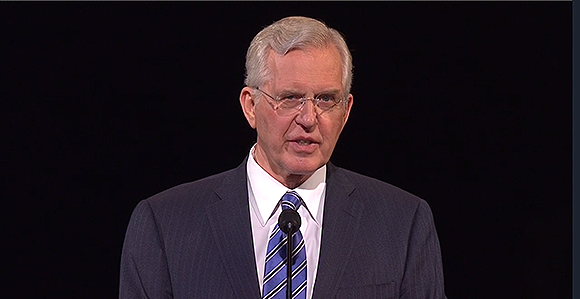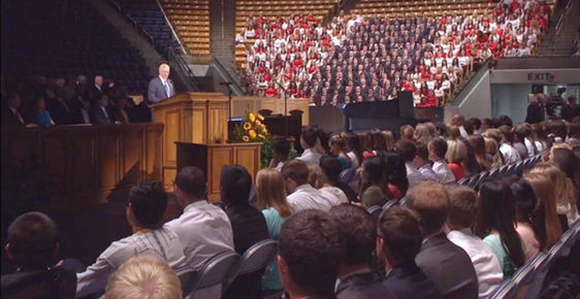Elder Christofferson Shares Blessings of Losing One's Life in Christ
Contributed By Marianne Holman Prescott, Church News staff writer

Elder D. Todd Christofferson of the Quorum of the Twelve Apostles speaks to young adults worldwide during a CES devotional September 14, 2014.
Article Highlights
- Three guides to help an individual lose his or her life in Christ:
- 1. Let him deny himself, and take up his cross daily.
- 2. Whosoever confesses me, I will confess before the Father.
- 3. For what shall it profit a man if he shall gain the whole world, and lose his own soul?
“Our lives should be a confession of Christ and together with our words testify of our faith in and devotion to Him.” —Elder D. Todd Christofferson of the Quorum of the Twelve
PROVO, UTAH
As individuals lose their lives in Christ and His gospel they are able to find authentic—and eventually eternal—life, taught Elder D. Todd Christofferson of the Quorum of the Twelve Apostles during a Church Educational System devotional held in the Marriott Center at Brigham Young University on September 14.
“The more I think about it, the more amazed I am at how consistently Jesus gave His life to the Father, how perfectly He lost His life in the will of the Father—in life and in death,” Elder Christofferson said. “This is precisely the opposite of Satan’s attitude and approach, which have been widely adopted in today’s self-centered world.”
Looking to the scriptures where the Savior is speaking to His disciples, Elder Christofferson shared three comments that provide valuable guidance in helping individuals lose their life in favor of “the real life, the authentic life, the celestial kingdom-enabled life that God envisions for each of us. That life will bless everyone we touch and will make Saints of us.“
1. Let him deny himself, and take up his cross daily.
Looking to the accounts found in the synoptic Gospels—including the Joseph Smith Translation found in Matthew—Elder Christofferson taught that “pure religion,” as defined in the scriptures is “to visit the fatherless and widows in their affliction, and to keep himself unspotted from the world.”
“It is a daily life of avoiding all that is unclean while affirmatively keeping the two great commandments—love of God and fellowman—on which all other commandments hang,” he said. “Thus, one element of losing our lives in favor of the greater life the Lord envisions for us consists in our taking up His cross day by day.”
2. Whosoever confesses me, I will confess before the Father.

Elder D. Todd Christofferson of the Quorum of the Twelve Apostles.

Elder D. Todd Christofferson speaks at a CES devotional September 14, 2014, at Brigham Young University in Provo, Utah.
“A second accompanying statement suggests that finding our life by losing it for His sake and the gospel’s entails a willingness to make our discipleship open and public,” he said.
One obvious and rather sobering meaning of losing one’s life by confessing Christ is to use it literally and physically in sustaining and defending a belief in Him, Elder Christofferson said. “We have grown accustomed to thinking of this extreme requirement as applying in history as we read about the martyrs of the past, including most of the ancient Apostles. Now we see, however, that what was historical is moving into the present.”
Referring to current news reports from around the world explaining how Christians and other minorities are being driven from their homes—some even being killed for their beliefs—Elder Christofferson spoke of the persecution that sometimes comes to believers.
“Surely such souls will be among those whom the Savior will not be ashamed to confess before His Father in a future day,” he said. “We know not what may come in the future, but if any of us should face the trauma of literally losing our life in the Master’s cause, I trust we would show the same courage and loyalty.”
The more common—and sometimes more difficult—application of the Savior’s teaching has to do with how individuals live day by day, by the words they speak and example they set.
“Our lives should be a confession of Christ and together with our words testify of our faith in and devotion to Him,” he said. “And this testimony must be stoutly defended in the face of ridicule, discrimination, or defamation on the part of those who oppose Him ‘in this adulterous and sinful generation.’”
Although Christ came to bring peace, His coming also introduced conflict—between Christ and the antichrist, between light and darkness, between Christ’s children and the devil’s children, even between members of the same family, Elder Christofferson taught.
Sharing the example of an Amish family who joined the Church a few years ago, Elder Christofferson spoke of their faithfulness despite consequences—a “shunning”—from their immediate family.
“Yes, the cost of joining the Church of Jesus Christ can be very high, but the admonition to prefer Christ above all others, even our closest family members, applies also to those who may have been born in the covenant,” he said. “Many of us became members of the Church without opposition, perhaps as children. The challenge we may confront is remaining loyal to the Savior and His Church in the face of parents, in-laws, brothers or sisters, or even our children whose conduct, beliefs, or choices make it impossible to support both Him and them. It is not a question of love. We can and must love one another as Jesus loves us.”
Although familial love continues, relationships may be interrupted, and according to the circumstances, even support or tolerance may at times be suspended for the sake of a higher love, said Elder Christofferson.
“The best way to help those we love—the best way to love them—is to continue to put the Savior first,” he said. “If we cast ourselves adrift from the Lord out of sympathy for loved ones who are suffering or distressed, then we lose the means by which we might have helped them. If, however, we remain firmly rooted in faith in Christ, we are in a position both to receive and to offer divine help.”
If, or more realistically when, the moment comes that a beloved family member wants desperately to turn to the only true and lasting source of help, he or she will know whom to trust as a guide and a companion, he taught. “And in the meantime, with the gift of the Holy Spirit to guide, we can perform a steady ministry of lessening the pain of poor choices and bind up the wounds insofar as we are permitted. Otherwise, we serve neither those we love nor ourselves.”
3. For what shall it profit a man if he shall gain the whole world, and lose his own soul?
Drawing from the words of the Savior as found in the scriptures Elder Christofferson said, “And whosoever will lose his life in this world, for my sake, shall find it in the world to come. Therefore, forsake the world, and save your souls; for what is a man profited, if he shall gain the whole world and lose his own soul? Or what shall a man give in exchange for his soul?” (Joseph Smith Translation, Matthew 16:28–29 [in the Bible appendix]).
The priorities and interests most often seen in today’s world—and oftentimes in oneself—are intensely selfish. Whether it is a hunger to be recognized, the demand of one’s rights to be respected, a supposed right never to be offended, a consuming desire for money or things and power, or a sense of entitlement to a life of comfort and pleasure and the minimizing of responsibility to avoid any personal sacrifice for the good of another—all are present.
“This is not to say that we should not seek to succeed, even excel, in worthy endeavors, including education and honorable work,” he said. He later added, “Certainly worthwhile achievements are laudable, but if we are to save our lives, we must always remember that such attainments are not ends in themselves, but means to a higher end. In our faith, we must see political, business, academic, and similar forms of success not as defining us, but as making possible our service to God and fellowman—beginning at home and extending as possible in the world.”
Personal development has value as it contributes to development of a Christlike character, Elder Christofferson taught. “In measuring success, we recognize the profound truth underlying all else—that our lives belong to God, our Heavenly Father, and Jesus Christ, our Redeemer. Success means living in harmony with Their will.”
The greatest example is that of the Savior, the only person who was able to perfectly do those things that the Father asked.
“In giving His life, Christ not only saved His own—He saved the lives of all of us. He made it possible for us to exchange what would otherwise have been an ultimately futile mortal life for eternal life.”
As individuals are able to follow the Savior’s example, they are able to save their lives.
“While you live, let your life be an offering,” Elder Christofferson counseled. “Take up His cross each day in obedience and service. These are the implications and the fruits of our faith.”
